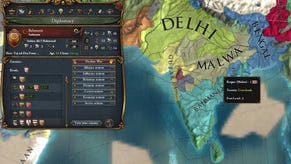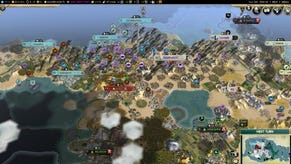Civilization 5: Gods & Kings Review
For God's sake.
Good news, everyone! Civilization 5: Gods & Kings isn't that good.
Like a despicable ex-girlfriend, Civ 5 has actually aged very well. Its pan-historical plotting is as addictive as ever, meaning the entire game remains a meticulously wrought black hole that devours time itself. Suddenly, providing York with citrus becomes more important than peeing. A fantastic expansion could have brought about the end of civilisation as we know it, which would have been ironic, as well as a pain. You'd need to own a generator to play Civ 5, for a start.
But yes, Gods & Kings isn't that good.
You won't discern what's wrong with it from a peek at the features list, which is generous enough for £20. The expansion adds nine new playable civilisations (Netherlands! Mayans!), each with a unique trait, units and/or a building, as well as a general dose of new technologies and things to build (the Great Firewall of China! Bomb shelters! Machine gunners!).
More excitingly, Gods & Kings pours religion and espionage into the game, meaning there's yet more to scheme about on the world map. Finally, naval combat, diplomacy and city-states have been retouched, Civ 5's inadequate AI has received some attention and three new scenarios offer something a bit different, including a steampunk sideshow titled Empires of the Smoky Skies.
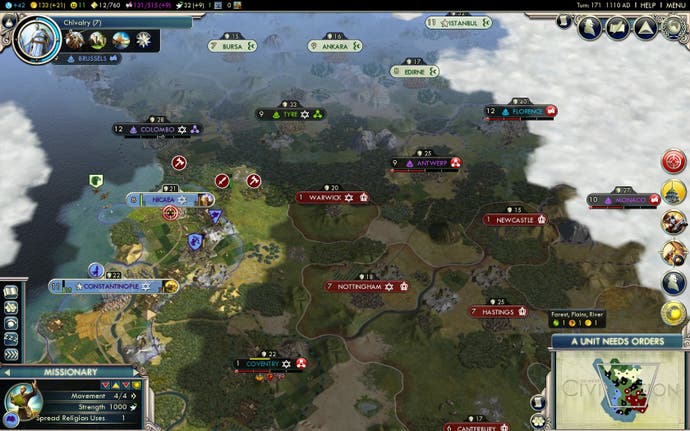
All this makes Gods & Kings a strategy smorgasbord rather than a focused expansion of any one area. Let's start with the most delicious stuff and work our way down.
Religion is by far the most consequential extra, bringing with it the brand new resource of Faith. I had an awesome opening to one of my games where my Spaniards battled for over 200 years to capture Mt. Fuji purely because it ejaculated great handfuls of Faith on a yearly basis.
Amass enough Faith and you can start a customised religion - in my case Spanianity, obviously - which will then spread organically as well as via your own missionaries (bought using Faith) and prophets (a new type of Great Person). Most importantly, each of your cities to follow the religion will enjoy a Founder Benefit of your choice (+1 happiness if next to a river, say), while cities of other civilisations will enjoy a totally different Follower Benefit, also hand-picked by you from an equally lengthy list, though this time you'll want a bonus that's as useless as possible.
It's an interesting mechanic and has a lustrous appeal, in that it lets you boost your civilisation's speciality still further or patch up a weakness. But it's here that the system loses momentum. Dominating the world with your flavour of Sikhism or Islam (Russikh? Italylam? Maybe you'll be more inventive than me) robs other civilisations of their founder benefit, but it doesn't necessarily destabilise or prepare them for your invasion.
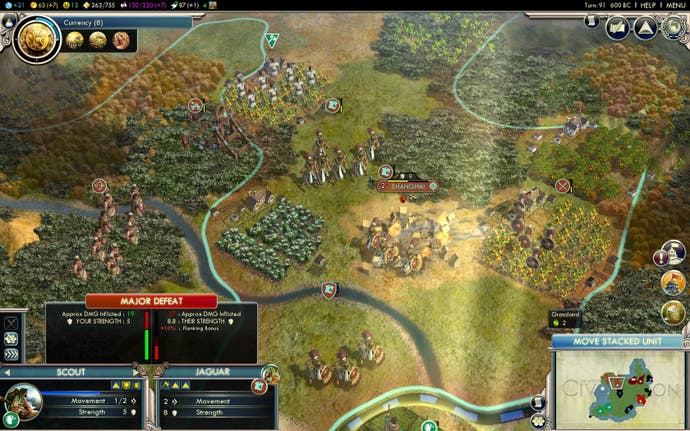
Down the line, technologies might unlock a building unique to your faith, or a Messiah might allow for the construction of a Holy Site on the world map, but this happens in stops and starts. This, together with an almost imperceptible meanness of visual flair around new religion content, means the system feels less interwoven with the rest of the game than it should and more like a sort of Turin Shroud draped over the top.
But it's still robust and well thought out, and since Faith can also be spent on units, civilisations geared entirely around religion will gain a sharp, military edge. Besides, in comparison to Espionage, Religion is the second coming. I'd almost be inclined to call Espionage cheeky. Were you hoping for a chance to dispatch tiny dapper gentlemen around the map? Yeah, so was I.
Espionage is a menu. The moment anybody hits the Renaissance era, every civilisation is gifted with one spy, and spies are simply sent to any city you've discovered via a spartan menu. A spy in a City State will "rig elections", silently dredging up influence for you while polluting that of your opponents. A spy in an enemy civilisation will pilfer technology. A spy in your own city protects against other spies. And that's more or less it.
Spies can be caught and do gain levels, but it's less sexy than it sounds and much more Excel. The whole system is a bit bizarre, like an extra cherry on top of your sundae, but in placing it the chef left a couple of fingerprints in the cream. Given the choice I expect I'd still eat the cherry (play with the feature), but I wouldn't pay extra for the sundae (the expansion) because there is a fingerprint (an underwhelming implementation).
"On the first day I installed it, my three meals were toast, a sandwich in the afternoon and a sandwich at midnight. There's your capsule review."
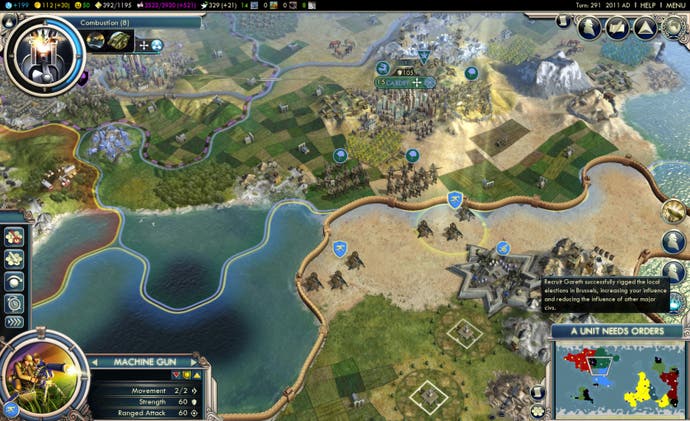
Which brings us to alleged improvements in the AI, which was always Civ 5's black eye. The AI failed to defend its own cities, was diplomatically unreadable and was always swinging nonsensically large armies at you from out of the fog of war. It was a bit like playing against Deep Blue if the work experience boy had just spilled Mountain Dew down the back of it. Anything above the actually-quite-easy normal setting saw the AI becoming not smarter but an increasingly blatant cheat.
In Gods & Kings, it's hard to discern an improvement, but not impossible. The AI's still cringingly terrible at using the tactical combat that's a true highlight of Civ 5, but this time around I didn't encounter anything truly surreal. (Bismarck endlessly crashing chariots into my capital, for example.)
All told, like some absentee father, Gods & Kings is much more likeable when it's not busy disappointing you. Civ 5 getting yet more civilisations, wonders, units, buildings and tech is as inarguably endearing as said father making an unexpected deposit in your bank account.

The TLC shown to city-states, naval warfare and diplomacy is similarly nice. City-states give more varied quests and care less about gold, so earning their affection is both trickier and more satisfying. Likewise, the AI gets catty when you win over one of their own city-states, giving yet more personality to these adorable non-combatants. Naval Warfare is also now a smarter game, featuring admirals and embarked units stacking underneath military ones. All good stuff.
Finally, you've got those new custom scenarios. Initially, I didn't understand why you'd want to paddle in the shallower waters specific to Ancient Rome or a quick-n-shifty Steampunk total conversion when Civ is designed to paint in much broader strokes. But after my Byzantines suffered an eye-watering defeat, I realised they do, in fact, play a role. They're palate-cleansers for whenever you don't feel up to a fresh start, with all the greasy granary action that entails.
For Civ 5 owners, the most important strategic decision in Gods & Kings is whether to buy it or not. At £20, it's not unreasonably priced, especially since it does succeed at making the game feel fresh again, meaning you're going to get hooked again, meaning that for £20 you're getting dozens and dozens of hours of play. On the first day I installed it, my three meals were toast, a sandwich in the afternoon and a sandwich at midnight. There's your capsule review.
On the other hand, once you know the reworked espionage, diplomacy and AI all disappoint, Gods & Kings' feature list starts to look a lot thinner. In a series that's always had a certain pride to it, what you're paying for here, really, is a renewed addiction and precious little else. That's a bit of a shame for Civilization and civilisation alike.


